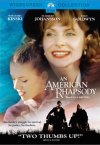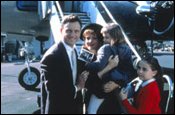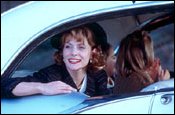BUY THE DVD:
|


|
|
|
SYNOPSIS:
| |
in 1950, a hungarian couple, peter and margit, are forced to flee from the oppressive communist country for the usa with their eldest daughter maria.
|
|
|
MOVIE FACT:
| |
the movie is based on the true life story of writer and director of the film, eva gárdos.
|
|
|
MOVIE FOTOS:
|


|
|
|
RATING:
|


two out of four possible stars
|
|
|
|
An American Rhapsody has a story that on paper, is filled with heartache, suffering, and heroism, but the film that has come out of it is missing the passion and tension needed to make the film memorable. While aspects such as art direction and costuming were accomplished with intelligence, the dialogue and actors were not as impressive. The word subtle comes to mind in describing the performances and with the subject matter at hand, the drama needed to be more intense.
As with any story that deals with war and oppressive regimes, the harsh life experienced by the characters needs to be highlighted through the look and feel of the characters. But there were too few instances where the difficulties faced by the Hungarian characters did not seem as urgent as they should have been. Tony Goldwyn and Nastassja Kinski, who play Hungarian parents forced to leave their country their life behind because of war and unrest, look beautiful together on screen, but aren't very affecting emotionally in their roles.
The pace of the film has much to do with why this story isn't as gripping as it should be. While it is not much more than two hours, and doesn't necessarily drag, many scenes are far too long. There is a lot of dialogue in this movie and a lack of physical movement by the characters that make for a very staid stretch of film. If the performances had been more intense, the long scenes might have been warranted, but the dialogue was too soft for that. The screenwriting itself was not poorly written, it was simply not spiced up enough.
This film could have benefited from two changes. The first being a firmer hand in the editing room. Although there aren't prolonged periods of silence, if the film still could have benefited from a faster pace. The other solution would have been to spice up the screenplay. Although the cast was competent in their roles, there were no standout performances. And in point of fact, one of the most likeable characters in the film was portrayed by Kelly Endresz-Banlaki, who played "Suzanne Sandor" at age six. Suzanne was the daughter left in Hungary while still an infant by Tony and Nastassja's characters.
Suzanne is raised in Europe until the age of six without the modern conveniences that her parents and older sister enjoy until Suzanne is finally brought to America to join her family. She leaves behind a foster family in Hungary that she longs to go back to and visit until she gets the chance when she is fifteen years old. The time of the film spent on Suzanne's character while she is a six year old is the most interesting of the film. Though ironically, even though it is not the most emotional, it is still more enjoyable.
The film as a whole, while not the most superior example of a true-life story of communist refugees, is still well made and is a topic worth knowing more about. While it does not take place on the front lines of a war, that type of element is still in the forefront of these characters' minds and the actors seem to accomplish all they can through the dialogue given to them. The restrained feel of the film is a direct mirror of what the characters tried to escape in their flight from Hungary. The fact that this film has a feel to it, could be considered a success.
But it makes for a very sedate film that veered more toward boredom than excitement. Even the fact that over a third of the film was recorded in Hungarian dialogue doesn't make up for the epic look missing from the story. As it was evidently a very personal story told by its director, this film is interesting because of its historical value, but not a film that will appeal to the casual moviegoer. While there are moments of drama, the film hums along quietly and doesn't make enough of an impression.
Review by Kelsey Wyatt.
| |
|